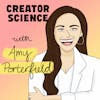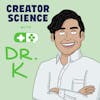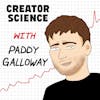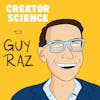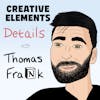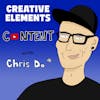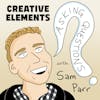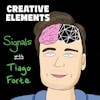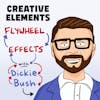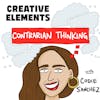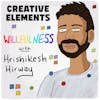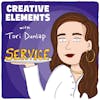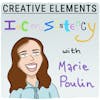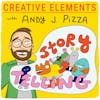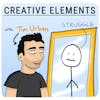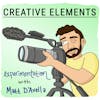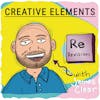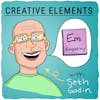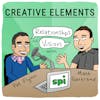
#22: Pat Flynn and Matt Gartland – Why Pat acquired a Matt's agency in order to grow Smart Passive Income
Play EpisodeSmart Passive Income is a media company elevating entrepreneurs to within reach of their dreams.
Pat Flynn and Matt Gartland are the partners behind Smart Passive Income (SPI). Smart Passive Income is a media company elevating entrepreneurs to within reach of their dreams.
The Smart Passive Income podcast is one of the top Business podcasts with more than 60 million downloads.
In this episode we talk about Pat’s journey starting SPI, Matt’s parallel journey building Winning Edits, their successful and failed projects, and ultimately why they decided an acquisition made sense.
Transcript and show notes can be found here.
Get started with BetterHelp and save 10%
Try Podia and save 15% for life as a Creative Elements listener
Earn money by sharing this show
Join our community on Facebook
Want to support this show? Click here to buy me a coffee.
Brought to you by The Podglomerate
***
ABOUT JAY CLOUSE
Subscribe to my weekly newsletter
Enroll in my course on podcasting, Podcast Like The Pros
***
This show is a part of the Podglomerate network, a company that produces, distributes, and monetizes podcasts. We encourage you to visit the website and sign up for our newsletter for more information about our shows, launches, and events. For more information on how The Podglomerate treats data, please see our Privacy Policy.
Since you're listening to Creative Elements, we'd like to suggest you also try other Podglomerate shows surrounding entrepreneurship, business, and careers like Rocketship.fm and Freelance to Founder.
Learn more about your ad choices. Visit megaphone.fm/adchoices
Pat Flynn 0:00
In order to grow the business and help the people that we wanted to help, we needed more players within the business, more brains and eyes and ears focused on our audience and fully invested in the audience.
Jay Clouse 0:14
Welcome to Creative Elements, a show where we talk to your favorite creators and learn what it takes to make a living from your art and creativity. I'm your host, Jay Clouse. Let's start the show.
Hello, welcome back to another episode of Creative Elements. I have another great show for you here today. Talking with one of the biggest names in online business, Pat Flynn. Pat is the founder of Smart Passive Income or SPI. It's a platform that creates educational content in training experiences for online entrepreneurs, but before Smart Passive Income, Pat built Green Exam Academy, an online study guide to help people pass the LEED exam. That's LEED. And if you're wondering what a LEED exam is, you're probably not alone. So let me break it down. LEED stands for Leadership in Energy and Environmental Design. It's a term in architecture. And it's the most widely used rating system in the world for rating whether or not buildings are environmentally friendly. You see, in 2008, Pat was a working architect. But due to the 2008 financial crisis, he was let go from his architectural job. And from that misfortune, past life building online businesses was born.
Pat Flynn 1:47
So I focused on the architecture thing for a while and then in late 2008, I built what's called Smart Passive Income, which is my website and playground for just experimentation and sharing a lot of these experiments publicly with people and The experiment I was sharing was this new business in the architecture space and just being very open about the process. I was sharing my income reports and that was putting me on the map because no other entrepreneur is really sharing those kinds of things.
Jay Clouse 2:10
As you'll hear in this interview, that architecture thing that he focused on for a while, was really successful. Those income reports that Pat was talking about are actually how I first found his work. And I can't tell you what year I saw his first income report, but I can tell you that in doing research for this episode, I went all the way back into the archives of October 2008. And I highly recommend you do the same. It's very encouraging and I think you'll read a lot there that you can relate to. SPI has grown a lot since 2008. Pat has published several books including Let Go, Will It Fly and Superfans he has several online courses including Power of Podcasting, Smart from Scratch in one to three affiliate marketing, and that doesn't even include his podcast. The Smart Passive Income podcast is one of the top business podcasts with more than 60 million downloads. More than 400 episodes, and ask Pat, his second show has more than 1000 episodes. So if you're like me, you probably look at guys like Pat and wonder how does one person do all of this? Well, the answer is, it's not one person. We just don't often hear about the team behind that person. Today, we're gonna be telling that story. Because I'm not just interviewing Pat. I'm also interviewing his business partner, Matt Gartland.
Matt Gartland 3:27
We didn't necessarily know I didn't necessarily know who's going to lead to this tremendous moment, right. But it naturally I think, led there and.
Pat Flynn 3:35
You were listening to one of my team members, Matt Gartland, who I have on the show today, to make a huge announcement with you about the SPI brand about where I am in business and about where we are in business. Matt's been on my team for quite a while. And some of you may not even know what our relationship exactly is and my relationship with the team is and I'm just going to tell you upfront right here before we get into it. That up until January 1, I was the only employee of my business Flynndustries, LLC. Even though I had a team, I was still the only employee on paper.
Jay Clouse 4:12
That was a clip from SPI Episode 354, which originally aired on January 16, 2019. In January of 2019, Pat formally acquired Matt's creative agency winning edits to continue to fuel the growth of SPI. Matt had been running his agency for nearly seven years at the time of the acquisition, and had worked with Pat as a client for years leading up to it. I've had the incredible opportunity to work with Pat and Matt through the launch of their recent membership community SPI Pro. And as I've come to learn their story, I wanted to get on the mics and share it with you too. So in this episode, we talked about Pat's journey starting SPI, mats, parallel journey building, winning edits, how the two came together, both their successful and failed projects. They're excited working together for several years, and ultimately why they decided an acquisition made sense. We have two elements to highlight in today's show Pat grants relationships as a key in his online success. And Matt points to vision as one of his key driving forces. And as you'll hear from them in this interview, those elements are a perfect example of exactly how these two came together, and why they work together so well. As always, I'd love to hear from you. As you listen, you can jump into our Creative Elements listener group on Facebook, or you can find me on Twitter and Instagram @JayClouse. But now, let's dive into the beginning of Pat's story.
Pat Flynn 5:46
Those are what I like to call the scrappy years. Right and every entrepreneur and business owner starts out a little bit scrappy, but I was laid off in 2008. And I had built a business helping people pass an architectural exam. And that website, in fact, is still up at Greenexamacademy.com and it teaches people how to pass this really difficult exam called the LEED exam. And that was where all my money was coming from. In fact, that business saved me because I had just gotten laid off. I just proposed to my girlfriend, April. Now my wife and times were tough. I had to move back in with my parents. And I was struggling, and I was hustling, struggling and hustling at the same time. Very thankful for the support I had from both April and my parents at the time, although my dad was like, Oh, you should probably go back to school to go get your graduate degree. Right. And he was right. I could have done that. But I was so hurt by doing everything that I was supposed to be doing and yet still getting let go. I was like, okay, that's not actually as much control as I thought it was. How can I have more control? So let me build something of my own.
Jay Clouse 6:39
At what point did you think that Okay, I guess I'm an online entrepreneur now. And this is what I'm going to be trying to make a living on. And also At what point did you think maybe Smart Passive income is the business more so than the exam business?
Pat Flynn 6:52
Definitely within the first couple years of starting something of my own, like the architecture website, it was still the architecture website was the crux of the business. SPI Smart Passive income was just the place to share the journey. And number one, I didn't really believe I was an entrepreneur, even though I was making on the architecture website $20,000 to $30,000 a month, I still in the back of my mind was thinking, how long is this going to last? Is this just a flash in the pan, literally still going out to job interviews for architecture. And the analogy I like to use is a ladder, right we we climb the corporate ladder, and the higher you climb up on that ladder, you grab tighter and it's harder to leave that ladder. But then here comes this other ladder. And there's all these ladders around us. And I chose Internet Business and Entrepreneurship got inspired by a lot of podcasts that I was listening to at the time, which gave me the ideas gave me the inspiration I needed. Yet here it was climbing this new ladder, but I still had one leg on the other ladder. And there's no way for you to fully grow and expose yourself to all that that new opportunity has for you until you fully let go to the other. The specific moment where I knew I was an entrepreneur was when several months after getting laid off You're having architecture website do pretty well, still going in for architecture jobs. My boss who laid me off, called me to check up on me. And he was like, hey, Pat, how are you doing? You know, I know times are rough right now. And again, this was back in the recession. And it was rough for a lot of people. So I appreciated that he called me to check up on me. But in the back of my mind, I was like, man, things are actually going really well right now. But I didn't like, share that right up front. But then he proposed something to me. He said, Well, why don't you come back and work for me, I started my own firm. I have some of the same clients that you're working on, you can just pick up where you left off. I even brought some of your co workers, your friends. We have a new office. I'll give you a corner office. I'll give you a raise, and I'll pay one year's rent for you for free. Just to come up, like I need your back. And the crazy thing was, I couldn't imagine saying yes to that.
Jay Clouse 8:51
Wow.
Pat Flynn 8:52
I couldn't believe number one that that was my default response. Like no way that doesn't sound great even though on paper that was like exactly what I would have wanted, but that was to me a sign and the realization that hey, I am now an entrepreneur, this is now the direction I'm going, that was me falling, letting go of the ladder and now climbing this new one. And there was no reason for me to monetize Smart Passive Income. I was surviving and doing really well with the other one. However, over time, a lot of people started to come to me for advice, I started to share more and more. And with that I found and discovered this world of affiliate marketing where I could share a process for completely free. However, you know, step three or four might have been a recommendation for a tool that helped me along the way. And I started noticing that people wanted to use the same tools as me and follow my process. And again, the more open I was, the more I shared, the more I started to see come back, both in terms of commissions from these affiliate recommendations, but also just people sharing like, Oh my gosh, this guy, he's sharing everything, like go check them out. And around 2009, 2010 I started experimenting with other businesses and websites and again, openly sharing that process. One big thing that put me on the map was something that was called the niche site tool. where a person who is in the same industry as me, challenged me to build a website and whoever could build the website fastest and make the first dollar would win. And this became sort of a public thing. And that business security guard training hq.com, I shared how I found that keyword, how we built the website, how we created the content. In 73 days, I got that to number one in Google, and I beat the guy who challenged me so that was that felt good. But secondly, this, this turned into an actual business. In fact, that was making $2,000 to $3,000 a month passively. Which then again, was another proof that oh, this guy who's teaching business stuff is not like those other guys who are snake oil salesmen. This guy's legit showing us the way and paving the way himself.
Jay Clouse 10:39
When did you actually realize that building an audience was really core to what you were doing?
Pat Flynn 10:45
It was when I actually started the podcast. I had publicly shared that I wanted to start a podcast in December of 2008. But it wasn't until a month and a half later that I finally mustered up the courage to actually do it. We all know that when we are going on We need to build an audience, right. But I think that there comes a moment when you really begin to believe that the audience actually matters more than anything. Because there's so much going on when it comes to building a brand and a business online. But the audience is really everything. Every decision we now make is for the betterment of serving our audience. And when you are a business owner, I've learned that your earnings are a byproduct of how well you serve your audience. So it was actually the podcast in 2010 when I was blogging three times a week, right? And only podcasting every other week, because that's all I had time for. Again, I was doing everything myself, including shownotes graphics, everything. Part of my career as an architect helped with a lot of the graphic design related things, but again, that got me in trouble later when I was like, No, I can do it. Why would I? Why would I pay somebody else to do it? So again, still struggling along the way. But I went to a conference I got invited to speak at and I saw a number of people who had heard about me and I started asking them questions like, Oh, so what do you enjoy? Like what stands out to you from my work? I just want to know what I can do more of that will help you and they're like, Well, you know what, I really love the podcast. That story you told about this. And that story told about that. And I was like, every person I spoke to, it was all about the podcast. I was like, okay, but like, what about the blog? I blog way more like, can you tell like somebody's telling me that they enjoyed the blog too. Now, I know the story told about the podcast. And the cool thing was they all spoke to me like we were friends, even though we were just meeting for the first time. And they wanted to do what they could, they could just support me. I never had received that kind of feedback or support from my blog. And I was like, Okay, I should probably shift where I'm putting more of my time. Let's actually reverse this. Let's do more podcasting. Let's do less blogging, because that's really what it's showing me where the audience is and where they're showing up. And now I continually even now years later, go to my UPS mailbox. And I get these handwritten thank you notes for people who are just like your show. changed my life. I've had some people mentioned it is stopped them from suicide. I have had people say it's help them save their family and their marriage. And just like, heavy stuff, that all happens because I just sit at home. And I speak into a microphone. And there's an audience there on the other side, podcasting in particular, but just content in general is amazing way to scale intimacy, and to be there and show up for people and even scale that in some manner. So that that happened quite quickly after I started the show.
Jay Clouse 13:24
As the podcast started to really grow the SPI audience, the interesting dichotomy of having a podcast being such a core driver to growth is that like you said that it can scale intimacy, and that intimacy is probably for better for worse with Pat. So how did you think about growing an audience for SPI while still being a human person that people know by name at the front center?
Pat Flynn 13:51
Yeah, I mean, Smart Passive Income often is very synonymous with Pat Flynn still right because it's me who's been there and shows up in my faces on there. I'm thankful now that we have now been able to establish new characters, right? Like with Madden, a lot of the other team members who are now showing up and I want them to be seen just as much as me now, which is really great. And it also shows the audience that you know, there's a lot of resources here a lot of superpowers that you can take advantage of for yourself. There was a time in 2011 when I had the podcast, and the blog, and a YouTube channel, and many, many, many more ideas. And I had a list of them that I shared with somebody who was mentoring me at the time, one of the co founders of internet business mastery, Jeremy Frandsen, he saw this list we were eating lunch at a Cheesecake Factory. And I wrote down these ideas on a gave him sheet of paper, sort of like back a napkin looking kind of thing. And I was like, Hey, I got more business ideas, check these out. And they were a wide range of different ideas that I had now gaining a little bit of confidence. You know, you unlock this confidence and you unlock and you open your eyes to more opportunities. Part of the hardships of entrepreneurship is knowing what to say no to right. However, I was wanting to say yes to all these things. And I shared them with Jeremy. And he goes, Oh, these are really great ideas. And I was like, right. He's like, but I was like, What do you mean, But like, but like you, I don't see you showing up in any of these, like, these are great business ideas. But the reason why Smart Passive Income is successful is because people are getting to know you. And it's a perfect playground for you to just be yourself. These I think, I think you would make them great. I think they would be professional. But they aren't you an SPI and even Green Exam Academy. You can see my face on there. It talks about how I had taken the exam how it was really tough for me, which is why I'm now trying to help out and be supportive of the rest of the architecture community with SPI I got laid off and now I want to share this with you all these other business ideas. Were kind of cool, but they weren't me. He's like you need to lean more into what people what you know, you know, people follow you. And the way that you've shared these lessons based on your experience, I would scrap this piece of paper and put this amount of energy that you were going to put into this into SPI. And it was a very, very wise piece of advice, because that's when I really started leaning into who I was and asking even a lot of my audience, why do you come to me? And that's when I started to really learn about what made me and my voice unique. The fact that yes, I was talking about entrepreneurship, like hundreds of thousands of other people. But I had these really open experiments where people could get a really insider look at exactly what was going on. Oftentimes things that people would normally charge for or put in a vault somewhere. The fact that I was family friendly was really important for a lot of people I didn't even know that was a I'm just not somebody who swears a lot right and I guess because Gary Vee was coming up at the same time. There was this really easy juxtaposition between Gary and his amazing advice but his f bombs and myself in my amazing advice and the family friendliness of it, right? So that that was a thing that I didn't even realize that was important. And so I leaned into that, I started bringing my family on to the show a little bit. Every once in a while, I started talking to the kids in the audience, right every once in a while, and a lot of people brought their families along the ride, right? A lot of people tell me they listen to the podcast in the car with their family. And that makes me super proud. And it continues to have me realized that the family component, and the family friendliness and my family showing up everyone smiles is an important component of this. And that's how I've known to use social media as a way to extend Yes, you find me for the content that's gonna help you with your business, but you get to know me on Instagram, you get to know me on Twitter. And I'm not afraid to share that I'm just a massive Back to the Future fan or I'm definitely afraid of spiders or any of these kinds of things that on the surface, like have nothing to do with business at all. But when it comes to the way that I think online business or just business in general should be done. It has everything to do with it because it's about the human to human relationship. So when people describe or talk about me with others, so I hear they go, Oh, Pat Flynn. Yeah, he's like, business owner, but he's just a super nerdy Back to the Future fan. And I love that they share little things about that. Because now I'm not just another podcaster or another entrepreneur. I'm Pat Flynn, somebody they know like a friend. And I absolutely love that. So, yeah, leaning into those components, and those things that make you unique is really key versus just trying to, you know, be general or please, everybody. And it's funny, because when I've leaned into that, yes, maybe it's pushed some people away who would rather go to Gary and that's fine. But I've been able to grow my audience stronger and bigger as a result of honing in on really who I am and what I have become known for.
Jay Clouse 18:43
Do you think there's a necessary order of operations or period of time before you start putting more of those human elements into the things that you're making?
Pat Flynn 18:52
ASAP, Is is my timeline I often recommend for our students to share your personality. Not necessarily like what you had for breakfast every morning, only what you're comfortable doing and what you know you've communicated with others, because that's important too, before you actually just start sharing everything. But there has to be something that people can hold on to beyond just the content that you're sharing. What is it about you, that makes you you? The beauty of this is nobody's like you, you are 100% original. Nobody takes advantage of that fact. And yet, we're putting ourselves in a space where we're trying to stand out, it's a little bit of a weird dichotomy, but the sooner the better. And if you are just starting out, and you have a small client list or small email list, or just a small following small number of subscribers, well guess what, now you have even a better opportunity and a better advantage over those who are much bigger who cannot possibly reach out and make those one on one connections like you can, you actually have an advantage being small and coming in now. You can see how other players are doing it and you can do it better. You can do it different. You can go in and make these and establish these one on one connections and become somebody who can become a resource. More likely and faster than somebody like perhaps even us who are working on a much larger scale. And I love that. And I think that's a huge opportunity with smaller brands is to make those connections and put some of your personality in there and right like you are right like you talk and not try to be like somebody else. You get inspired, get motivated by others. But you have to be you, or else you're always going to be second at best.
Jay Clouse 20:23
When we come back, we continue Pat's story from 2013. Right, as Matt was beginning to build Winning Edits, it didn't take long for the two of them to start collaborating. So stick around and we'll be right back. Welcome back to the show. After more than five years in business, Pat was really beginning to see success for not only Green Exam Academy, but now for Smart Passive Income as well. His podcast audience was growing, but he was beginning to hit the limits of what he could do on his own.
Pat Flynn 20:53
2013 was the point at which I was like, wow, I have a choice. I can either continue to do more and add more to the plate, I'm very much let's, you know keep filling that plate type of person. But if you do that, eventually you're going to get to the point where you're going to get overloaded, you're going to drown you're going to get burnt out. And I saw some friends of mine who were also being overloaded and actually, in fact, ending up in the hospital because they were spending too much time suffering in their relationships because of that as well. And I didn't want that, especially now that I had a one year old. I think the baby also had a lot to do with me going okay, well, where am I mentally now? And what's actually important here, and how can I continue to grow and scale but not burn myself out or not be the father that I should be or the husband that I should be? And that's when I started to find people and ask for recommendations and Matt and many other people came across my table for Okay, how can we relieve myself of some of this stuff, yet still continue to grow so that I can be everywhere I need to be but not do everything myself because that would be impossible. I that was a big lesson and 2013 was you know, when I felt madden started to get really obsessed with, okay, who else might be out there who can help?
Jay Clouse 22:03
So Matt about that same time you were leaving your enterprise career to go into your agency. So talk to me about that leap for you in where your head was at, you know, circa 2011. When you're starting winning at it.
Matt Gartland 22:19
Yeah, my exit different than pads I think motivated perhaps by a conviction to be your own person and pursue your own dreams. Certainly. I love my corporate career. I got into a leadership development program right out of school at Johnson & Johnson wanted to be in healthcare arena trying to make a difference rotated around the country on different leadership assignments out what brought me to Ohio and really thrived and building teams and leading innovative solutions with sales and marketing partners with me on the IT side trying to you know, sit with them and understand their their visions, and contribute to those visions and figure out how different innovative technologies whether they be new mobile apps or different ways to do it. Data Analytics and custom reporting on top of data sets, bring those solutions to bear right and be the person then that can translate a lot of that business speak over then to different production teams, designers, developers, data warehouse experts and engineers, etc, etc. Right? So I had a real boost from the get go on servant leadership. It's not my term, of course, it's a whole body of knowledge and study about it. But it really spoke to me really kind of resonated with kind of who I was felt that I was. So being able to develop teams build culture within team. You know, I cut my teeth on a lot of that really immediately out of school in those early years of enterprise, but knew I wanted to do something more. So I had an opportunity from a mentor to take a nine month full time business assignment, business consulting, when he left to join a pretty serious medical device startup outside of J&J. And he recruited me over and he was like, this is your bridge. This is your your nine month window to figure out your own thing, you know, on the side. You know why you can make a good living here doing some consulting work for me so I did that. That was my bridge out of like enterprise on, you know, to this day remain tremendously grateful for him map broad back. And you know that allowed me to not just kind of pull the ripcord and jump without a plan and not just pursue my passion kind of blindly without a conscious direction. And during that bridge moment was when finance was formed. I adore story and content I was electively taking composition literature classes in college, and all my IT friends thought I was on drugs, which I wasn't just about earliest, you know, the early era of film and media and like those just always fascinating to me. So when the blogosphere really started booming in the early 2000s, you know, upwards of like, 2010. Like, that's when the light bulb went off. That's when you know, Tim Ferriss happened, that's when all this sort of convergence started online around. Okay, this is technology, which I care about, and I'm really good at. There's more companies and startups forming around digital publishing. And content is a driving force now, and I love story. So I'm like, okay, I want to do something at that intersection. So the service agency is what I started with. And like a lot of us Jay including you know, freelance is that kind of first or you go through for a lot of us. So, you know, winning edits was first and foremost, me, just me. And then I started to recruit and build a team around me. And that starts again intersect back with Pat where he wasn't our first client. He was, you know, probably in the top 10 though for sure. But he always challenged us and always gave us permission to do more creative things. So as winning edits grew so with a focus on editorial work, so manuscripts working with several New York Times published authors, we got into podcasting. We worked with what might be a mutual friend of pets also Todd Henry accidental creative one of the like, og podcasters. So he got into podcasting produce some really cool shows back before podcasting, again, was anything what it is today. So we diversified and grew into being much more than just like working on books, whether they be traditionally published or self published, and that painted this, you know, trajectory to where you know what we are today. Not to fast forward maybe too fast here, but you what Pat and I have a vision to do through a variety of different forms of engaging content online and communities built around those is to continue to teach other creators how to build really high functioning businesses online that has a lot of diversification to them and be able to at some point, potentially in their own trajectory, and transformation, but teams around them right so that they can continue to do their best work and most high dollar most impactful work and having a great team around them to support and amplify their abilities to make an impact.
Jay Clouse 26:29
A lot of listeners of this show are running service based businesses, they may aspire to build agencies out of that. You're such a long term systematic thinker, as I know you, when you were starting this agency, what was your long term vision of the agency, as you're building it in the first several years,
Matt Gartland 26:46
I probably only had a three to five year vision and I am that crazy person that I think Pat comes to love and hate sometimes in terms of me, trying to live three years out and putting in place all these spreadsheets that project plans and everything else, but.
Pat Flynn 26:59
So many spreadsheets.
Matt Gartland 27:01
So many spreadsheets. But candidly, Jay, I didn't have I guess the what ended up being the seven year plan. Winning edits was a high functioning business for seven years. And I couldn't have foreseen what truly proved to be one of these golden serendipitous unexpected moments where you started, you meet that person, right, which in this case was Pat where it was just so fluid and so, so perfect, right to kind of formally join forces as partners and contribute to now, you know, really consolidated, bigger vision. I didn't see that I honestly didn't.
Jay Clouse 27:34
Before we get too far ahead of the story here. Let's pull back a little bit because long before the acquisition, Pat was introduced to Matt and his agency winning edits to work on a book project.
Pat Flynn 27:45
I think, in fact, it was Adam Baker, a good friend of ours who connected both of us together. Adam and I had worked together on a couple projects. We had been speaking on stages together, and I told him that I was writing this book and this book was going to be called let go about How I was let go from my architecture position in 2008. And then also simultaneously had to let go of who I thought I was supposed to be in order to grow and become this entrepreneur that I became. And he was like, This is such a great idea. Do you have anybody helping you with this book? And I was like, No, I'm still in the middle of writing. And he said, Well, you have to be introduced this friend of mine, his name is Matt, and he has this publishing company that would enable you to get this done much better, much faster. He's a great project manager, he'll help see this forward. And I highly recommend check them out. So that's how I got connected was through a mutual friend and relationship with Adam Baker. And first we work together on that project. And I was just really impressed because I'm more of a visionary type person, I have these big ideas. And I don't yet know exactly how to put them together. And immediately after sharing this vision with Matt, he was able to sort of like be that part of me that I that it was missing in terms of Okay, well, here's how we can actually hunker down and get this done. And I was like, Okay, this is exactly what I need. And that little project then turned into, hey, let's keep talking. And here are some other things that I have going on. Can you help me in the same kind of way wasn't even necessarily about books anymore but more on the content publishing on my blog and on the podcast and such. And that grew and then more and more we started to work together and form this relationship where I eventually just knew that Matt and all of his team was going to be such a major part of my business moving forward in absolutely was.
Matt Gartland 29:23
Yeah, Pat and I were both out at Chris Cobos. World Domination summit event, the first several years, I think. So we were, I think casually introduced but nothing really stuck until Adam made that introduction. I have a very vivid memory of our first Google Hangout called together back in the days where we used Google Hangout more than zoom or anything else. So that stuck with me, but certainly that the leko memor project was really the launching off point and a shout out also to Caleb Wojcik, a good friend of ours mutual friend, who was also involved in that project because we wanted to create a multimedia experience are really patented, in terms of that vision with video to compliment you know, the written manuscript for the book. So it was the three of us together working on this thing. So beyond just me being the editor and trying to help kind of shape and craft the story in the narrative. So Caleb came on to do the video shoots with Pat in San Diego, and I volunteered to also kind of take on, as Pat mentioned, kind of just managing the whole project, you know, soup to nuts. And it was a blast. I mean, it was a ton of fun is very successful. And that led to just, Hey, what about this? What about this, you know, in terms of a creative pursuit? And you know, I was in, I think, the first year of operating, you know, my creative agency at the time. And that was just always one of these like, like, yes, and sort of people like improv that, like, let's keep exploring, you know, what can we do? So the more that I lead my company, and that grew, you know, powers has always not only, you know, a great client, but increasingly a good friend. And he allowed us to kind of do the best work that we could and experiment in new ways. And he was really receptive to that. And we just played off each other, right, like improv and just things kept getting better and better.
Pat Flynn 30:52
I think the one thing that stood out to me about you, Matt, and how you worked is, you know, oftentimes I would hire people to do voiceover work for me. Or some other job here and there. And it was always like, they get the job done. They do it well, and then they move on. But you had always taken one additional step in the relationship building, getting to know me and my family, I thought that was really cool. And beyond that, also getting to know my audience and why this project was important. And who else was on the other end, or the receiving end of these projects versus a lot of these other contractors that we'd work with, which is just like, okay, we'll get the job done. And we're out. So I really loved how you cared about why I cared about these projects. And I think, in that I saw a much bigger future together with with the both of us working hand in hand. I knew how to write the book, it was my story, getting it out on Amazon, putting on these platforms, working with different kinds of people, editors, whatnot. I had no idea. That's how I approach my business sort of a ready fire aim approach, right? And that's a very visionary way of thinking. But the visionary plus integrator relationship is really where the magic happens. If you've read rocket fuel, you'll know exactly what I'm talking about. And Matt, I didn't know it at the time. Was that integrator the person to integrate these things that are required in order for this vision to happen? And or a person who can go, hey, that's a cool vision. But let's get back to reality here. This is what's possible, which often is the conversation that me and Matt have, which is sort of cool and also not cool at the same time. But it's necessary to have these conversations, right? Because I can't see in the way he sees but he also needs me as well. And there's there's a back and forth, right, there's a, there's a pass forward and a pass back and pass forward and pass back all the time. What I remember is that book, quickly launching to number one on Amazon, even after a it wasn't a failed launch, but we had experimented on launching on a new platform that was supposed to revolutionize the way reading was on it was really amazing. It was ahead of its time to be honest. But But despite that sort of misfire up front and that was due to just us taking a gamble with it really. And it was just fun and exciting. But we still despite that, we're able to launch on Amazon and get to number one within a day and within within not just the entire entrepreneurship category. And that I know is because I had the time. And I had the room, not getting so into the weeds of how this thing was being built, to go and get on other people's podcasts to establish relationships to reach out and serve others so that we can return get some love for let go. And that momentum was a result of the time I had, that I didn't have to spend on these other things that Matt was able to help produce. And that was so cool. That was like, Whoa, Okay, what else can we do this way now like, okay, now I can have even bigger visions. Now I can get potentially even more done. I just need the right people. And it was the first time I saw that in conjunction with what I said earlier, which was the care for the audience right. Now, Matt was also coming up with ideas coming back to me on ways that I didn't even think I could grow the brand and further services audience versus a lot of contractors you might work with, or just again, they do the job. But they really don't care. Not that they don't care, but they're just that's not their role. And many times you don't want to obviously overstep that role, but Matt, very grateful. He was like, you know, what if we did this and there's, you know, you have this superpower, why don't we extend that into your voice with the podcast, like there are so many other things that happened as a result of that. But it definitely was that first domino that knocked over the next one that knocked over the next one that knocks over the next one. It was just neat to see things done and done probably much faster and better than I could do on my own. So that I can focus on the relationships and the other things that I have to and only I can do, and that's what I've eventually learned is part of what makes a great leader is understanding also what your weaknesses are, and leaning into your superpowers but also handing off a lot of those things that perhaps you know how to do and can probably do, but probably shouldn't do if you want to be the best CEO of your company that you can be.
Jay Clouse 34:52
After the break, we explore how Pat and Matt's relationship grew, despite some projects that didn't go as planned and later We explore how online creators like Pat can avoid falling into the trap of vanity and ego. Welcome back to my conversation with Pat Flynn and Matt Gartland of Smart Passive Income. Around the same time that Matt and his team were working with Pat on his book Let Go. They also began working on their next project together a second podcast.
Pat Flynn 35:22
It was in 2013, 2014, when the second podcast came out, Ask Pat. And that was a result of a connection to a team member Mindy, who Matt found and allowed that podcast to happen. And we are now nearly 1100 episodes into that now. And I guarantee that wouldn't have happened if I didn't have the encouragement of what it was like to work with somebody who actually could do the job and do it well.
Matt Gartland 35:46
That show the aspects show we did you know, through winning edits work on from kind of moment one, because we were deeper in the relationship with Pat at that point. Mindy was on my team at that point. She was doing many things are many roles. One of which was audio production was our kind of, you know, in house audio engineer, certainly among other things, she's a very gifted person. My buddy Dustin was brought in my team admittedly on subcontract to design out the branding for that which was really cool and we had a chance to I remember Pat even design like an iTunes feature graphic because it got up in the in the big iTunes sort of marquee.
Pat Flynn 36:23
Yeah.
Matt Gartland 36:24
You know, to promote that show or a special episode. So maybe that's even a little bit further down the runway. But, you know, Jay, that that illustrates, you know, some of these these points in themes of like being able to expand capacity expand Pat's capacity through our capacity. So yeah, Ask Pat you know, was was a great success. That show actually was a daily show. For the first 1000 episodes Pat never missed a beat. We never missed a beat. So again, that kind of just proves like when you can find you know, that connection and you're really really clicking in your in your in rhythm. You know, you can you can do great things so you know that show 1000 episodes every day. Miss A lot of work and they made a lot of money, a lot of work and he did really well. And they brought in Ads. I was actually I think the first spot where we might have even had paid ads on the podcast. So it opened up a lot of new possibilities for us.
Pat Flynn 37:12
Not all projects worked out by the way.
Matt Gartland 37:15
Yes.
Jay Clouse 37:15
That I'd love to hear about.
Pat Flynn 37:17
Matt, would you like to dive into the summary?
Matt Gartland 37:18
Yeah, ah, I was gonna say breakthrough blogging, which probably was one that is classified as didn't work out. It was a great project that was the beginnings of online courses and was a creation that involved I think every aspect of the winning edits team at that time even along with some other kind of contractors into mix you know for the video piece or for some technology components there really weren't good online course platforms back then Pat i don't even think teachable existed at that time. For example.
Pat Flynn 37:51
No, it was like a member was the thing, right?
Matt Gartland 37:54
Yeah. So like we we spent a ton of time building this thing. This course deadlines. I think we ended up not even selling it, like but gave it away for free. Yeah, like right at the last minute, it was difficult to maintain largely due to some technology reasons. So again, from a business standpoint, sort of from just a pure dollars and cents, it probably was a failure quote unquote. But it galvanized more the working relationship that we had with Pat and had us proved greater potential as a thesis or use case for like what we could do in a different form of content production, multifaceted content production, and opened the door to what became the second generation of the third generation of the business model for SPI which was online courses. Because shortly thereafter, teachable did come around. Pat got in with teachable pretty early on, and we started to shift a lot of our prioritization to the production and sale of online courses. And that that was a paradigm shift for the business model. For SPI And even for me, I think in teams in terms of least like my memory and sort of my reflection on it, you know, that's when Pat and I were spending more and more time together, even just sort of as like pseudo business partners, we were just talking more business strategy, even though like I didn't have a foot in the door there, you know, at least formally, but like we were talking at that level in the same way. So that was a major inflection point.
Pat Flynn 39:21
I think breakthrough blogging, in addition to being sort of a content play with courses and whatnot, it was also a membership play. And I think we were a little bit ahead of ourselves in terms of what we were trying to offer and what we were on the ongoing process, able to offer versus we were, I mean, what we set up was beautiful, and we were able to crush exactly what we planned out. I kind of rushed into it, I think and did not yet have this beautiful process and the standard operating procedures for now what we do, which is we validate our product ideas first, before we actually execute on them, right we do a number of a lot of research, a lot of testing up A lot of the things that I talked about in my book, will it fly? The problem with it was that there was this expectation of new content that was going to come out that would be helpful every single month, that there was going to be this amazing network effect within that platform, which there was not the content eventually get to the point where and part of it was just, you know, jumping into it too quickly, without realizing Okay, ongoing how is this going to be we see this in software development a lot, we you hire developer, but then over time, you're going to need that thing to be updated and constantly added to but then you forget that you actually have to hire that developer, again, to keep these things updated. I had to hire myself to continually create content, and it was just starting to become very overbearing on top of the podcast on top of the YouTube channel on top of the blog. But we had set the expectation and eventually the quote unquote, content became a special guest once a month who came on to a live webinar that was in a replay, which felt like just sort of a well, I guess we'll give them something this month, sort of situation and there was hardly any ability for people to connect and network together, either. Other than, I don't even know if there was a directory in there, but there's just wasn't planned out very well. From my perspective, I felt so bad about how it went down. And what was promised that two and a half years after it was after it was sunset, before we launched online courses, I just had to wipe myself clean from that experience. So I went back to all the people who bought breakthrough blogging, and I offer them 100%, refund two and a half years after, because I just felt it just felt like the right thing to do. And a lot of people appreciated that. And, you know, many people said, No, don't worry, I still got value from it. But I understand a lot of people did happily accept it. And we're disappointed in how it was but thankful that, you know, they were able to get their money back. And many of those people then spent money with us later elsewhere, knowing that we were trying to do it the right way. And we eventually did. So that was breakthrough blogging, but then we've had a lot of massively successful projects as well. For example, Superfans book that came out in 2019. We actually released it at Flynn calm Which was a live event that the entire team put their heads together on and was amazing. We had about 500 entrepreneurs in San Diego, the entire team being involved. That was the first time a lot of the SPI audience got to meet the team, which was another sort of surfacing of whoa, people, like, not just pat, but the entire team here, we need to bring the team together more, we need to surface them more, which led into a conversation about eventually what what happened between the two of us, but Super Fans was a great launch. And I'm so proud of that book and the team, the editing team and the people who had helped with the marketing of it putting on Amazon again very much. That was my vision. I had it written, the team took care of the rest, and it was awesome. Same thing with FlynnCon, I was able to have the capacity to just show up and deliver on stage. And the team did a lot of the legwork to put it together and that that that was very similar to the Lego experience. And now we're doing more and more of that with online courses which launched at the end of 2017. We beta tested the power of podcasting which was a massive success we've ever earned well over a million dollars with that course alone, and are just so thankful that we can serve and sell at the same time. And now we've recently launched SPI pro together our membership community. And, Jay, you've been a massive part of that as well. Thank you for your help and service with that. Just so many cool things now. And I think that Matt and I both are now finding our stride with what works, how to do this work, and how to invest money into projects that will pay us back later. Because I think things like breakthrough blogging, you know, that those were tough times, seeing the dollars sort of spent on that and not coming back.
Jay Clouse 43:36
Something that's always been, like really apparent to me and something that I really admire is that you're a very low ego person. And at that moment where you're you're starting to realize that and a lot of people are tuning into me for my voice for this podcast up through today. It almost seems like there needs to be an inherent amount of some ego there to do it because if you have absolutely None, it seems like it'd be impossible to even get started to even put yourself out there to do that. So what has that journey been like for you? And how do you think about that? Because I know it's an SPI value to, to be low ego.
Pat Flynn 44:12
Yeah, I mean, some understanding that you have value to share, that you have value in your stories, your experiences, and other people can learn from that, whether you want to call that ego or something else that that's important to know. Because if you don't believe you have value to share, then you won't be able to help anybody. Right? You're only potentially going to hurt somebody or bring them down with you. And we don't want that leading by examples is a really key value of mine. But at the same time, there and I know we've all experienced people who find some level of success and an absolutely goes through their head, and ego becomes their middle name, or even the first name. I've had some friends in the internet marketing space, who were in this with me, we were together building our businesses. We were a part of a group called internet business mastery back in 2008. And that was the core. And that was the podcast I listened to that was the community I was a part of that helped inspire me to do what I was doing. And the two friends that I'm thinking of, I'm not going to mention their names, found success as well. And we're no longer friends. Because the money and fame change them, they are no longer the same people. Money changes people, and not always for the better. And seeing that happen in real time with them as I was also experienced success success. Although I miss those friendships and I miss those moments. I'm thankful that I was able to see an example of what not to be, and how not to let it get to my head and also the fact that I know it wasn't really their fault. They don't want to be like that. It's just that's what's become of them. And I think that what's really important and perhaps what they were missing was some support system to essentially read the label from outside the bottle. It's really hard to read the label when you're inside the bottle and to have support system To have people have mastermind groups, I have my wife. I mean, she once to told me that if my head grows too big, she's not going to be there to hold it for me. I was like, Okay, thank you for calling me on that. And she's very upfront about that. And I love that because I need that. And I've seen it in my friends who didn't have that kind of support. Again, like I said, they aren't friends anymore. So I think it considers a balance of the value and what you know, you have to share with others the confidence in serving others, versus cockiness, right, and there has to be a balance in that it's a learning process. I mean, there have been times where I've tweeted certain things based on the success that has put other people down, and I have to recognize that and have to pay attention. I have to listen to my audience. And at the same time, there's times where I share successes, and it motivates people and inspires people to make change and to do things they wouldn't have normally done. learning experience. There's no perfect formula, but consciousness is the real key word there I think.
Matt Gartland 46:55
Yeah, couldn't agree more with Pat to expand upon that. At least for first for SPI and how we define that core value. So Jay, I do appreciate you sort of acknowledging that it is a core value, I guess, first and foremost, you know, for us as a company, to share without ego is to as we have defined it, and it's on our website, you know, to be our authentic self and to to share that authentic version of ourselves as individuals as a company and to support an amplifier or audience, you know, without compromise, because based on on my experiences, similar to pat in terms of relationships, friendships, business partnerships, you know, those were ego definitely gets in the way is when I think they'd become false. Right when vanity begins to override, the authentic nature of a person begins to warp thinking and cognition and ultimately decision making and behaviors. And that's what you know, at least for me, personally, is very difficult to contend with when you know, I'm potentially losing a friend or a business partner and you know, I've gone through some rocky stuff, but it is exemplifies and I'm almost even proud that I have gone through those moments because now like with, with patches my partner in the team that we have and what we do like, it does help illustrate for us conversations like this and be humble, hopefully to play some of these experiences forward, which is a big part of our mission, so that other creators and entrepreneurs as they're trying to expand their efforts, and maybe explore business partnerships, hire folks onto their teams, build a culture around themselves and continue to be authentic and real for their audiences. They don't get almost corrupted, right by that fame or that sense of power and influence and money to such an extent where they start to take things for granted. They start to have maybe fantastic relationships become transactional relationships, they start to take their team for granted start to put their team down, start to not maybe support and invest in their team culture. You know, by contrast, you know, I think, and I'm proud to say that, you know, for us at SPI and it's something I've always done in all my past companies, you know, we try to provide health care benefits, and we do across the board medical, dental and vision at a level where we didn't necessarily need to do that we're certainly not required to do that. I think we're tremendously generous with a lot of our paid leave policies, a lot of real serious things that, you know, what Pat will say is like, it's not the sexy side of business by any stretch, but like our team feels. And I know this from asking them, I know that from surveys that we take, they love us there, they understand that our culture is real and authentic. So just being able to do that, I think, and acknowledge that is critical. It's not devoid of ego, I just see the ego as a power it can be used for good or evil.
Jay Clouse 49:32
Okay, so we know how the story ends. After seven years of working together with Pat as a client to Matt and his agency winning edits. The two decided in January 2019 to formally join forces. But I know that decision couldn't have come easily to Pat or to Matt. So I wanted to get into their heads to understand why they both ultimately decided this was the best path forward.
Pat Flynn 49:55
I mean, throughout the years, I've had a lot of buddies of mine also business owners who we're like, Pat, you gotta hire a team. And I was like, you have a team. You know, I got I got freelancers, I have contractors, I have VA s, I pay them all separately. It's super easy, super clean, like, no, no. But there's something special that happens when you invite people into your business. And they feel like they're a part of it with you versus just doing your work for you. And I was like, Yeah, I get that. But you know, I was honestly just quite scared to have that permanent. Although it's obviously not a permanent permanent, but it's it's more permanent feeling than Oh, well. It's just a contract that could eventually end and I can move on and have more options, right? So part of it was just options. Part two is just I felt really scared. If I was imagining, you know, somebody who worked for me, and if I didn't do the things I was supposed to do, then that person's life would have been affected because they relied on me. And there was that sort of weight on my shoulders as well. And I always just was always looking for excuses, so much paperwork, there's additional taxes i have to pay I have to now go to my payroll company and bookkeeping company. And this is just another added level of complication. Why don't we just Pay contractors, I can just pay Matt and his company, one and done Yes, it's a little bit more expensive because I'm paying agency fees on top of what it would normally cost but that that's what I'm paying for the convenience of that. And Matt and his team were awesome. And other people I've worked with same thing, but eventually came to the point where in order to grow the business and help the people that we wanted to help, we needed more players within the business, more brains and eyes and ears focused on our audience and fully invested in the audience. And right now, I was getting like, I don't know, if I could put a percentage point but I was like, Oh, I'm getting 65% of everybody who works for the, for the brand, because they also have other clients they need to work on. Right? And then Matt came and proposed, very mathematically, why this made sense, in true Matt fashion, with spreadsheets and cards and all this stuff, and just how, you know, really knowing that I felt this way about this idea, but also showing me how Much less work. It actually was because he and the rest of the team would take care of a lot of that paper, he and the rest of the team would, you know, be there for, you know, an additional 35% of time. And essentially, it would cost the same, but I'd be getting more time. So I was like, well, that actually kind of makes sense. And having tools like gussto that allow for us to easily do payroll and easily take care of health benefits and stuff, like it was just, okay, it makes sense. And plus, I know that in my experience, this uncomfort can often be a sign that this is probably the next right thing to do. I mean, there's obviously certain levels of comfort where you're just like, oh, that's not good. I don't consider that uncomfort to be always a sign of where I need to go, but I knew in order to grow the business, and the fact that this was scaring me a little bit, I felt this scared this before. Before getting on my podcast before getting up on stage before sharing my books. This had very similar sort of gut to throat sort of feelings. And I knew with Matt behind me and that with that The decision not just being on me, but on him. I knew that there was because I trusted him. And we've worked together that this was just not a light thing that he was making up. This is something that he also researched and felt was a smart decision for both of us too. And we've had it we had a number of chats. Matt, I know you remember me just asking a ton of questions and just always going, Well, what if this or what about that? And you always had a great answer, or always was able to get an answer for me and was very upfront about the fact that you considered how I felt and knew that it wasn't going to be an easy decision and never made me feel pressured. And, you know, we had dated for a long time and nine, he was like, You know what, let's, you know, let me get down on one knee and let's sign the paperwork. You know, that?
Matt Gartland 53:41
Well, I think I had the first proposal at some point. So I'm pretty sure I was the one on one knee at least initially, but yeah, as as Pat said, it was, you know, the, the combination of, you know, a really healthy like dating relationship right and over time as as you We both built experiences together and separate, you know, me with our other clients. And Pat working on different projects that we weren't a part of where my headspace was was one of just supreme business transformation and the possibilities of that transformation. And I find it endlessly fascinating just as like something to study because there's a lot out there legitimately academically just about businesses and their life cycles and going through major phases of growth, right? You know, there are very predictable patterns of growth and evolution and the struggles that come along with those lifestyles like you are a human and you go through infancy you go through toddler years, you go through adolescence into adulthood, and there's significant pattern recognition moments, right. And I felt for winning edits, you know, coming up at that time on seven years and how we would want to grow coming out of FlynnCon that pat referenced where that did speaking of discomfort, I mean, it was a phenomenal experience. But Pat's right to say it might have been around like 45% but but like, we got pushed up in terms of our team being devoted to like Pat as a client or as an account, to yeah, 45% or 50% of our total capacity, which if anyone listening is running a services based business knows that that's not healthy. Like you don't want to have one client or one account represent that much of your revenue, right? It's, it's potentially destabilizing. So anyway, it was like, Okay, if we don't do this, like I'll have two winning edits, consider some significant business transformation in terms of hiring and more and doing some different outbound growth stuff right to kind of continue to grow and stay within health, healthy profit margins, being a very kind of profit for sort of an organization etc. And then also then for Pat, that would have fostered different conversations with him around you know, transformation for SPI and what he wanted to continue to do. Maybe we had we had have to scale back or maybe different things would have to change. So it's like okay, do we do we go in that direction still together, but but in a very different way, versus what could be public? For SPI if we join forces and transform together, you know, into this new thing, which I always felt would be the far exciting, more challenging, or at least different challenges, but more rewarding and satisfying. I think at the end of the day for what we could achieve together.
Jay Clouse 56:14
Did you have to sell your team as well, man, meaning like sell them on the idea?
Matt Gartland 56:20
No, especially not Mindy. I mean, because Mindy was one of my first hires and, and as a consequence was, you know, pretty involved with a lot of Pat's projects from you know, the pretty much you know, the early days I can't think of a single person that wasn't some version of yes to hell yes. You know, like this makes such such good sense. Because as anyone who does freelance or service work, you know, as a part of an agency knows, you're gonna have bad clients, you're gonna get just kind of crapped on unfortunately, from time to time and we did have, you know, some bad clients. I'm glad that we had few. So like, again, the transformational conversation that headspace of okay to grow into hit that next kind of, you know, wave. Now, in terms of evolution for the company, do I risk taking on clients I would otherwise have said no to and they don't kind of, you know, pass my judgment, or, you know, do we truly just come together here and you know, the team, the team knew that it was it wasn't really a sell as the conversation was one conversation it was over.
Jay Clouse 57:21
So now for the future. How do you guys think about what success looks like in this partnership?
Matt Gartland 57:28
The way I think about it these days is that we're sort of a two headed happy monster that has over a lot of time, kind of figured it out where you know, Pat is able to, you know, be so magnificent as he always has been, but with with increased capacity and discipline, just on the creative side, right on the audience, building on the engagement on nurturing the community SPI pro being a literal community, and really being able to amplify and grow his genius, right, you know, for for a lot of that and where I can then compliment and support and enable him by leading on the business stuff. And still, I think to a lot of, or a very significant degree kind of being a blackbox, you know, for Pat, where he doesn't need to know, you know, kind of the inner workings on a lot of it. We talk very regularly we have our partner sync, you know, weekly, we debate things, certainly. But there's so much trust and faith and common direction, you know, to what we want to do that the, you know, that rocket fuel book that Pat mentioned, talking about, you know, visionaries and integrators and it's all about Ultimately though, you know, kind of that yin and yang harmony, where like, I think we're both visionaries. I actually think Pat's, also an integrator, because he did so much of this himself, like he knows this, how this stuff works. So we're able to see it and have a little bit of each other in each other. Right, but we're able to, though, have more clarified roles and responsibilities that we can then communicate along those those lines, you know, to the team, to our partners, and ultimately magnify together through increased focus and discipline. To what each of us are responsible for.
Pat Flynn 59:03
Voltron. Basically
Matt Gartland 59:04
I love that Voltron is great. You know, it's good Voltron.
Pat Flynn 59:08
Let's go Voltron. I was gonna say Power Rangers. But let's you know, although I grew up
Matt Gartland 59:13
Ah, Voltron is nerdier. I love that.
Pat Flynn 59:16
Let's do Voltron. You know, the different components coming together for a much larger hole, right? And what's cool is like, Matt, and I might be like, the two legs, right? Like you can't move if there's two important parts, but we're also seeking out and looking for, okay, well, where or what or who might be the arm and the other arm? And you know, how can we combine forces with others, right, and we see this in the more corporate business world, a lot of acquisitions, a lot of teams working together, partnerships for the betterment of both companies. And I think we're just seeing the beginnings of things like that Matt and I are combining forces and likely, potentially even combining forces with others. Who can complement who can also get behind the vision and the mission and our ideas of helping people in our brand, achieve. It's really exciting. And I think that although I am now 12 years into my entrepreneurial career, I really do think we're just getting started and with now a lot of successful projects behind us, perhaps some money you invest and a lot more vision in combined vision together, we can help and serve even more people and make a bigger dent. And also now both of us now being parents, also leading by example for our children. Matt and I, interestingly enough, fun fact we both share the same birthday and year.
Matt Gartland 1:00:44
That's insane.
Pat Flynn 1:00:44
Which is kind of crazy.
Matt Gartland 1:00:45
In the universe.
Pat Flynn 1:00:47
So I guess you just took all the growth genes that day, and didn't leave any for me but going back to just the future together, a lot of partnership, talk partnership, choices, partnership, just excitement. And every week when we talk Yes, we talk about in debate about a lot of things that are happening. But we also have talks about the future and where things are going. And those are my favorite conversations personally, because that's where I live. That's what gets me excited. That's what gets me up in the morning. And to know that somebody is there behind me to help execute on those things, is so great. And I'm so grateful for Matt. And, you know, Thanks, Jay, for having this space for us to talk about these things. We haven't had really, any time especially now as parents, both of us to just sit and chat and, you know, have scotch and just talk about how this is all coming together. I'm excited for that. And to have that be a regular thing too.
Jay Clouse 1:01:49
This conversation was such an incredible look behind the curtain and not just at Smart Passive Income, but also at Matt's experience running an agency and working with high profile clients. Like I said at the top of the show, it's so rare that we hear how the sausage is really made behind the scenes, especially when a business has found so much success around a particular person or a face of the brand. So I'm thankful to both Pat and Matt that they were open to sharing their journey, and I think it speaks to who they are as individuals and business owners to be willing to share that look. If you want to learn more about Smart Passive income, you can subscribe to SPI right here in your podcast player, or visit SmartPassiveIncome.com. Thanks to Pat and Matt for being on the show. Thank you, Emily Klaus for making the artwork this episode. Thanks to Brian Skeel for mixing the show and also creating our music. If you'd like this episode, you can tweet at me @JayClouse and let me know and if you really want to say thank you, please leave a review on Apple podcasts. I'll say it week after week after week. Thanks for listening, and I'll talk to you next week.
Most Popular Episodes
New to the show? Check out some of our most popular episodes.






